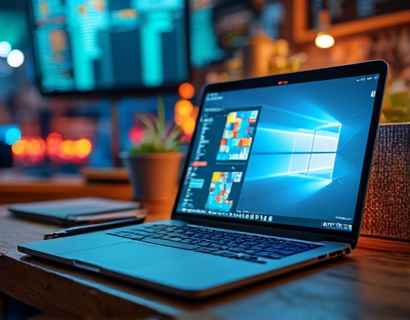Decentralized File Management: Revolutionizing Business Collaboration with a Secure and Efficient Online Platform for Teams
In the rapidly evolving landscape of business collaboration, the need for secure and efficient file management solutions has become paramount. Traditional centralized file management systems often fall short in addressing the complexities of modern team dynamics, where collaboration spans across geographical boundaries and requires high levels of security and accessibility. This article delves into the transformative potential of decentralized file management, highlighting how a cutting-edge online platform can revolutionize the way businesses and teams handle their critical information.
The concept of decentralized file management is rooted in the principles of blockchain technology and distributed networks. Unlike conventional centralized systems where data is stored on a single server or a few servers, decentralized systems distribute data across a network of nodes. This distribution not only enhances security by eliminating single points of failure but also ensures that data remains accessible even if some nodes go offline. For businesses, this means a more resilient and reliable file management system that can withstand cyber threats and data breaches.
One of the key advantages of decentralized file management is its ability to enhance collaboration among team members. Traditional centralized systems often lead to bottlenecks and inefficiencies, as files need to be shared and re-shared through multiple channels. In contrast, a decentralized platform provides a unified interface where team members can access, edit, and share files in real-time. This seamless flow of information not only speeds up project timelines but also fosters a more collaborative work environment.
The user interface of a decentralized file management platform is designed with the end-user in mind. Intuitive navigation and a clean, minimalistic design ensure that users can quickly find and manage their files without unnecessary complexity. This ease of use is crucial for adoption, as it reduces the learning curve and encourages consistent use among team members. Whether a user is uploading a document, sharing it with a colleague, or tracking version history, the platform simplifies these tasks, making file management a straightforward process.
Security is a top priority in any file management solution, especially in a decentralized environment. Centralized systems are often targets for cyberattacks due to their centralized nature, making them vulnerable to breaches. Decentralized platforms, on the other hand, distribute data across multiple nodes, making it significantly harder for attackers to compromise the entire system. Additionally, advanced encryption techniques and access controls ensure that only authorized users can view or modify sensitive information. This multi-layered security approach provides peace of mind for businesses handling confidential data.
Another significant benefit of decentralized file management is its scalability. As businesses grow and the volume of data increases, centralized systems can struggle to keep up, leading to performance issues and increased costs. Decentralized platforms are inherently scalable, as they can easily accommodate more users and data without a drop in performance. This scalability ensures that businesses can grow without worrying about the limitations of their file management infrastructure.
Decentralized file management also promotes data sovereignty, giving users greater control over their information. In a decentralized system, users can choose where their data is stored and who has access to it. This level of control is particularly important for businesses operating in regions with strict data protection regulations. By maintaining ownership of their data, companies can comply with legal requirements more effectively and build trust with their clients.
The implementation of a decentralized file management platform involves several key components. At the core is a distributed network of nodes, each storing a copy of the data. These nodes communicate with each other to ensure data consistency and integrity. A consensus mechanism, often based on blockchain technology, is used to validate transactions and updates to the data. This ensures that all nodes have an accurate and up-to-date version of the files, preventing conflicts and data corruption.
To further enhance security, decentralized platforms employ advanced cryptographic techniques. Files are encrypted before being stored on the network, and access is granted through private keys or other authentication methods. This means that even if a node is compromised, the encrypted data remains secure. Additionally, audit trails and logging features allow administrators to monitor access and usage, providing an additional layer of security and accountability.
From a technical standpoint, decentralized file management platforms can be built using a variety of technologies. Blockchain technology forms the foundation, providing a secure and transparent way to manage data. Smart contracts can automate workflows and enforce access controls, reducing the need for intermediaries and manual interventions. The use of peer-to-peer networking ensures that data is distributed efficiently across the network, optimizing performance and reducing latency.
For businesses considering a transition to a decentralized file management system, there are several factors to consider. First, the platform should offer a robust user interface that is both intuitive and feature-rich. The onboarding process should be straightforward, with comprehensive documentation and support available to help users get started. Integration with existing tools and workflows is also crucial to minimize disruption and ensure a smooth transition.
Another important aspect is the platform's ability to handle large volumes of data and high user traffic. The underlying infrastructure should be designed to scale seamlessly, ensuring consistent performance even during peak usage periods. Security features should be thoroughly tested and compliant with industry standards to protect sensitive information. Finally, the cost structure should be transparent and competitive, with pricing models that align with the business's needs and budget.
The impact of decentralized file management on business collaboration cannot be overstated. By providing a secure, efficient, and user-friendly platform for file management, businesses can significantly enhance their productivity and streamline their operations. Teams can work together more effectively, regardless of their physical location, leading to faster decision-making and innovation. The reduction in file sharing bottlenecks and the elimination of single points of failure contribute to a more agile and responsive organization.
Moreover, the adoption of decentralized file management aligns with the growing trend of digital transformation. As businesses increasingly rely on data-driven insights and collaborative workflows, the need for advanced file management solutions becomes more critical. A decentralized platform not only meets these needs but also positions businesses at the forefront of technological innovation, setting them apart from competitors.
In conclusion, decentralized file management represents a significant leap forward in how businesses and teams handle their files and collaborate. By leveraging the strengths of decentralized networks and advanced security measures, these platforms offer a secure, efficient, and scalable solution for modern file management. As more organizations recognize the benefits of decentralization, the adoption of such platforms is likely to grow, reshaping the future of business collaboration.











































